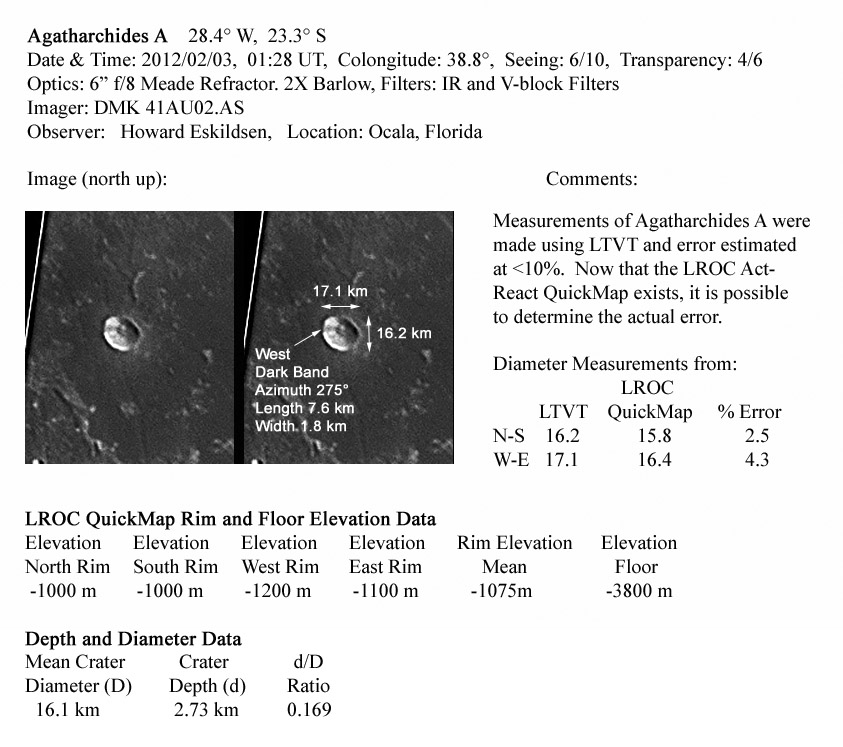Difference between revisions of "December 19, 2012"
| Line 3: | Line 3: | ||
<!-- ws:start:WikiTextHeadingRule:0:<h1> --> | <!-- ws:start:WikiTextHeadingRule:0:<h1> --> | ||
<!-- ws:start:WikiTextLocalImageRule:6:<img src="/file/view/LPOD-Dec19-12.jpg/393457850/LPOD-Dec19-12.jpg" alt="" title="" /> -->[[File:LPOD-Dec19-12.jpg|LPOD-Dec19-12.jpg]]<!-- ws:end:WikiTextLocalImageRule:6 --><br /> | <!-- ws:start:WikiTextLocalImageRule:6:<img src="/file/view/LPOD-Dec19-12.jpg/393457850/LPOD-Dec19-12.jpg" alt="" title="" /> -->[[File:LPOD-Dec19-12.jpg|LPOD-Dec19-12.jpg]]<!-- ws:end:WikiTextLocalImageRule:6 --><br /> | ||
| − | <em>image by [mailto:howardeskildsen@msn.com | + | <em>image by [mailto:howardeskildsen@msn.com Howard Eskildsen]</em><br /> |
<br /> | <br /> | ||
| − | A few days [http://lpod.wikispaces.com/December+15%2C+2012 ago] the crater Agatharchides A was shown in a 60 year old drawing and a very new spacecraft image. Now Howard has combined both the amateur approach, updated from sketching to video imaging, with measurements from space craft data. The results do not revolutionize the understanding of the crater, but they do illustare that quantitative data can be routinely derived for every lunar feature we study. Morphometric comparisons can be made of multiple features of the same type to characterize them as a group to illustrate how they are similar to or different than generic bowl shaped craters. The LTVT [http://ltvt.wikispaces.com/LTVT tool] created by Jim Mosher and the [http://target.lroc.asu.edu/da/qmap.html?mv=eqc&mcx=-855218.45808&mcy=-704744.87276&mz=7 | + | A few days [http://lpod.wikispaces.com/December+15%2C+2012 ago] the crater Agatharchides A was shown in a 60 year old drawing and a very new spacecraft image. Now Howard has combined both the amateur approach, updated from sketching to video imaging, with measurements from space craft data. The results do not revolutionize the understanding of the crater, but they do illustare that quantitative data can be routinely derived for every lunar feature we study. Morphometric comparisons can be made of multiple features of the same type to characterize them as a group to illustrate how they are similar to or different than generic bowl shaped craters. The LTVT [http://ltvt.wikispaces.com/LTVT tool] created by Jim Mosher and the [http://target.lroc.asu.edu/da/qmap.html?mv=eqc&mcx=-855218.45808&mcy=-704744.87276&mz=7 QuickMap] Path tool for LRO data democratise quantitative investigations - we can all do it, not just professional lunar scientists. <br /> |
<br /> | <br /> | ||
| − | <em>[mailto:tychocrater@yahoo.com | + | <em>[mailto:tychocrater@yahoo.com Chuck Wood]</em><br /> |
<br /> | <br /> | ||
<strong>Related Links</strong><br /> | <strong>Related Links</strong><br /> | ||
Revision as of 16:58, 11 January 2015
More Moore

image by Howard Eskildsen
A few days ago the crater Agatharchides A was shown in a 60 year old drawing and a very new spacecraft image. Now Howard has combined both the amateur approach, updated from sketching to video imaging, with measurements from space craft data. The results do not revolutionize the understanding of the crater, but they do illustare that quantitative data can be routinely derived for every lunar feature we study. Morphometric comparisons can be made of multiple features of the same type to characterize them as a group to illustrate how they are similar to or different than generic bowl shaped craters. The LTVT tool created by Jim Mosher and the QuickMap Path tool for LRO data democratise quantitative investigations - we can all do it, not just professional lunar scientists.
Chuck Wood
Related Links
Rükl plate 53
21st Century Atlas chart 23.



